The Secret Lives of Nomads
Article and photos by David Joshua Jennings
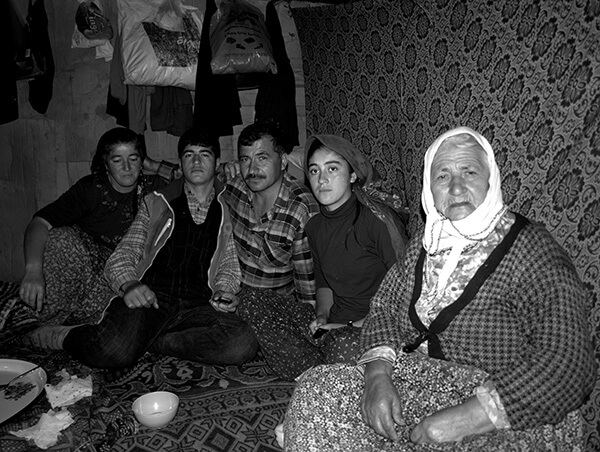
|
|
Turkish nomadic family in their tent.
|
It was my second day hitching along the Turkish Mediterranean. I was standing on a road above the village of Kalkan when a man rounded the corniche, walking backward with his thumb out. When he saw me, he stopped and stared. He squinted to read my sign, which I’d written “Demre,” and approached, realizing I was a hitchhiker.
He had a lime-green sash around his head and wore loose-fitting şalvar pants. His name was Olaş. He was from Istanbul, a student who was completely broke and traveling around to see his country. The only thing he carried was a sleeping bag.
It was late in the afternoon. As the sun fell, the white-washed villas of Kalkan turned fuchsia. The little sailboats rocked peacefully in the harbor, and the shadow of the nearby mountain elongated over us.
After half an hour, a car rounded the bend and pulled over. Its tinted window descended, and two men wearing sunglasses offered us a ride. Olaş talked with them. All I understood was that these men, like Olaş, had just gotten out of the army.
It turned out to be one of the worst rides of my life.
A few seconds after we got in, the driver cranked up the music and slammed on the gas pedal, accelerating to over 100 km per hour. Then, slammed on the brakes as we screeched around a tight turn, then slammed on the accelerator again. We were traveling on a narrow, winding coastal road whose ledge, a few feet from our tires, had no guard rails and dropped 50 meters into the sea. I was terrified.
We swung around a blind corner in the wrong lane, dodged a honking truck by inches, and slid around another bend. The driver was purposely fishtailing, sweeping the tires within inches of the ledge. He accelerated again, steering with his knee as he lit a cigarette and handed it back to me. My hand was trembling as I took it. I looked out the window and envisioned us careening over the cliff. Before I realized it, without even smoking, the cigarette had burned down to my fingers.
The driver looked at me through the rear-view mirror to ensure I was frightened. I tried to pretend I wasn’t, but I desperately gripped the seat before me on the next turn. The driver laughed.
“Are you okay?” he shouted.
“I’m fine.”
He drove even faster.
We asked to be let off in the first town we came across and stumbled out of the car, quite shaken. Olaş and I were both burning with adrenaline. Nevertheless, we couldn’t express ourselves to each other due to the language gap. We parted ways. I walked down to the beach, pitched my tent, and lay in the sand for a while, thinking about how easy it was to die. I tried to sleep but couldn’t, so I swam away my excess energy into the sea.

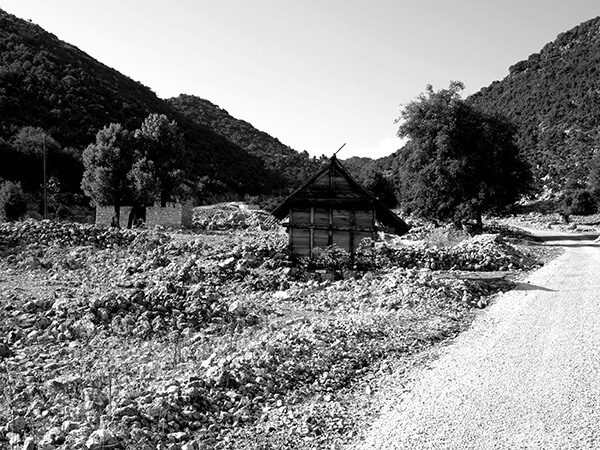
|
|
Beloren.
|
The word “discover” first appeared in English in the 1300s. It comes from the Old French word descovrir, meaning to uncover, unveil, and betray. To maliciously expose, more or less, like ripping someone’s clothes off to reveal their nakedness. “Discoverer" originally meant “informant.”
Then, beginning in the 1550s, its meaning shifted. To discover meant “to obtain knowledge or sight of what was not known.” To discover meant to make known. The discoverer was now the frontiersman, going forth with a lantern into the darkness, which they consequently dispelled.
For the traveler, discovery has two meanings: to make known but also to expose and, in some ways, to betray.
Discovery implies a dominant perspective. What are we saying when we have discovered a new place — a village in the Himalayas, perhaps, or some remote island in the Pacific? We are saying that these people and places remained shapeless until the eye of our culture came upon them as if our gaze gave them existence. This perspective ignores that discovery, at least between conscious entities, is always a two-way street. When Columbus discovered the Americas, the Americas simultaneously discovered Europe.
Those of us born at the end of the 20th century come into a world where it is said that the possibility of discovering new places has been exhausted. Our gaze has penetrated nearly everywhere, and often, this discovery has been more in line with the discovery’s original definition of maliciously exposing.
It does not take much reflection to realize how false this idea of a totally discovered world is. Regardless of how many people have walked the same path we now walk, there will always remain room to experiment with how we walk it. There are always side paths, hidden to those in a hurry, that the discerning and deliberate traveler will find or create for themselves. And these paths don’t necessarily have to be physical. Every person you meet along the way is a country in themselves, with a personal history often as vast as the places we so blindly drift to one after the other. One can look at the sea's surface and think they’ve seen the sea, but that is only for those without the imagination to penetrate deeper. Our world's sea is unimaginably deep and changing at every moment. The possibilities of discovery are inexhaustible, but if it is a true discovery you want, you cannot expect to find it in a guidebook or any book. In books, all you will be given is what is known. It is in the nuance of the experience, not in books, not in geography, where the traveler’s El Dorado is to be found.

My travel itinerary was straightforward but fraught with uncertainties.
One year before the ride mentioned above, I trekked through the mountains along the Turkish Mediterranean, hoping to find nomadic Turkish shepherds called the yörüks. I had been successful. About two days inland from the coast, I encountered a family of nomads who showed me enormous hospitality. I had taken portraits of them during my visit. With no intention of doing so, I promised to return one day with printed copies.
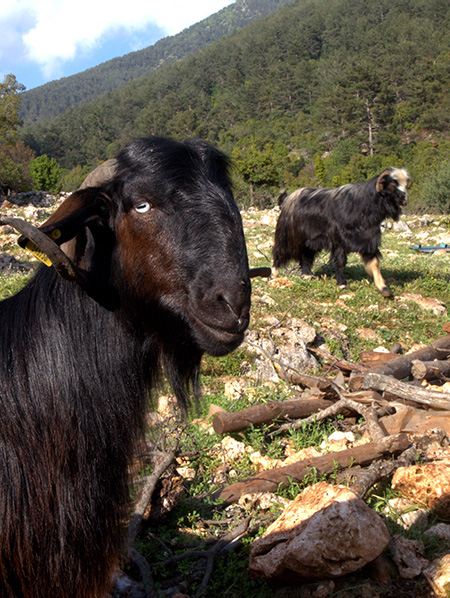
|
|
A couple of goats wonder what I am doing here.
|
I was now fulfilling that promise, hoping to find them again and that they would recognize me and perhaps even invite me to stay with them. I wanted to learn more about their lives and what, if any, correlation existed between me and them, as we both led unanchored, peripatetic existences.
After waking up on the beach, I hitchhiked to Demre. I trudged, loaded with camping gear and a week’s worth of food, through town to the rural purlieus, crossing a dry riverbed. I passed a mosque long fallen into ruin, its doors broken off, and a mangy Bactrian camel grazing outside.
I came upon a crowd of people gathered for a wedding. Over 100 men sat on rugs in the street outside what I assumed to be the home of the husband’s family. The women, all headscarved, were either inside the house handing platters of food out of windows or gathered inside the fence on the lawn. As I walked past, a man jumped up and hurried after me, insisting I join them.
I dropped my gear and sat cross-legged at a low table. I was immediately surrounded by men who wanted to shake my hand and extend their welcome.
Five courses and a bowl of goat meat were brought out on a tray.
Everyone at my table ate silently from the same bowls with their hands.
After we were finished, they asked me where I was heading.
I pointed towards the mountains.
“To find the nomads,” I said.
They told me I was crazy but blessed me and loaded me with food for the journey.
I hiked mindlessly for hours up rough, rocky terrain until I summited the first steep cliff, one of many, before reaching the shepherd’s well, where I planned to camp that night.
In the distance, a storm was blowing up from the sea. It began raining, and soon, lightning was zapping the trees across the valley. I tarped my bag and ran as fast as possible until I found a dense patch of low cypresses and crouched under my tent tarp beneath their branches. There was nowhere else to hide. As I sat there, a crackling noise arose, and the air took on a sweet electrical smell. I put my feet together, with my weight on the balls and my hands on my forehead, so that if lightning struck, the electricity would travel to the ground through my extremities rather than my heart.
I crouched there miserably for over an hour, cold and wet, jumping each time the thunder exploded. When the rain ended, I hiked until I arrived at my destination, a well I had used the last time I was there, but found it muddy and contaminated with dead animals. I pitched camp anyway, figuring I had enough water to last the night. After dinner, I built a fire and stared into it until the flames went out.

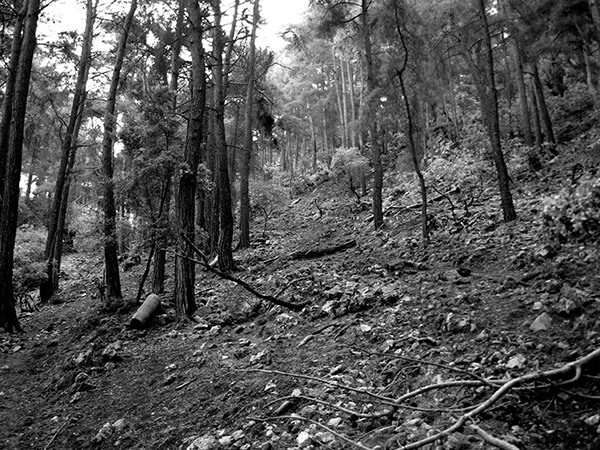
|
|
The Forest.
|
In the morning, I packup up my gear. I set off through the forest along an alluvial path of wet stones, past a clearing where three beekeepers lived in a nylon tent. All three squatted outside shirtless on tree trunks in front of their beehives, supping watered-down goat yogurt out of tin cups. They stared at me like I was an alien. I hiked on.
The trail was wet with dew and very quiet. I walked for hours, whistling, listening to the birds sing, past berry bushes and swaying grass fields.
Around noon, in a dark forest of Cedar trees, I saw a shepherd hobbling up the trail in my direction with the help of his staff. When he spotted me, he stopped. Another shepherd appeared beside him. They squatted on the ground together and watched me closely. When I got up, they got up, so I sat again. I wanted them to approach, but they sat back down. We stared at one another from an impossible distance. I waved. They waved back. I moved on.
I contoured around two valleys, up and over a ridge. I slid down an incline of loose, chinking shale onto a newly bulldozed road that eventually ended in a fence. As I undid the wire, a young boy, maybe 18, greeted me in English from the hill above. That’s the last English he spoke.
He invited me into his family’s courtyard for tea and patted for me to sit down next to his father and two women who looked to be over 100 years old. Since we couldn’t communicate, I felt awkward as I sat while everyone stared at me. The boy knifed open a bag of tea, sprinkled some in the cooker, and came to stand near me with the knife still gripped in his hand. Nobody spoke. A weird tension arose in the air, like the suspense before a duel, and then the boy stabbed the knife into the wooden beam by my side, grinding it in, staring at me as he yanked it out.
I carefully followed the knife's whereabouts with my eyes, answering the simple questions the father asked me about my homeland in the best Turkish I could muster. For a moment, I thought they were going to rob me. Instead, the boy put the knife away and brought out a small feast of cheese and vegetables. As I ate, they gathered around, attentively watching as I put the food in my mouth and chewed. One of the women burst into laughter.
“Look at how you all stare,” she said. “Leave him alone. Let him eat!”
These people lived in a solid wooden house and were not the yörüks I was searching for. The yörüks own nothing but goats and whatever they can carry on the backs of their donkeys and camels, which they lead down to the coastal pastures in the summer, where they camp until the sun withers the vegetation. Then, they move up to the yaylas, the high mountain plateaus, and valleys where their flocks can graze until the autumn rains regenerate the lowlands.
Two days later, I descended into the valley where I had met my nomad family one year earlier. Halfway down, raindrops began to dimple the path, and I stopped, wound my tarp up through some branches, and watched as the clouds pulled a downpour over the gully. When it ended, I trudged down to the bright green valley floor, which was littered with stones as white and round as ostrich eggs. As last time, a clan of nomads had pitched their goat hair tents here for the summer. Two older women were slugging up buckets from a well in the nave of a ruined Byzantine church.
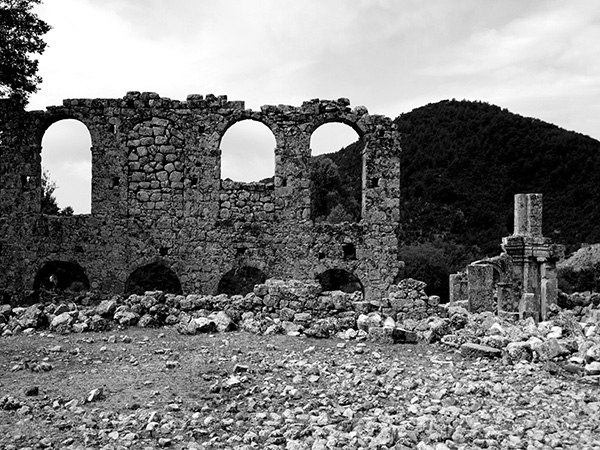
|
|
A ruined Byzantine church.
|
I continued up the valley to my family's tent, but nobody seemed home. “Salaam alaikum!” I shouted.
A young girl emerged and stared at me like she had never seen me before. “Alaikum salaam,” she said.
I asked if she remembered me.
After a moment, she said, “Yes, you are the man from Istanbul.”
I pulled out the cloth pouch that held the photographs and showed her.
She pinched one between her fingers and brought it to about one inch from her face. It seemed to jog her memory. She smiled. Her teeth were yellow. I smiled back. She said thanks.
At this point, I expected to be invited inside her home. However, she walked backward through her broken wooden gate while looking at the photos and vanished into her tent.
I stood there for about five minutes, unable to believe what had happened. When no one else emerged, I moved up the valley, glancing often over my shoulder. What was I supposed to do now? My whole reason for going there had been destroyed.
As I had no obligations, I decided to hike to Finike, about four or five days away. Yet, it was still hard to accept that I had come all this way, halfway across the country, to see these people, and they didn’t seem interested in me.
On my way up the valley, I came upon a ferocious wild dog on the path. It growled at me. I threw it a piece of bread, which it snatched from the air, swallowed in two smacking gulps, and began growling again. I sprouted my umbrella, hoping the expanded octagon of nylon would frighten it. I inched my way past, twirling the umbrella and walking backward as it followed me, barking and growling until it lost interest.
Within a few minutes, I decided I did not want to continue hiking, with all the contaminated wells, wild dogs, and arduous trekking awaiting me. I turned back, deflecting the angry dog again with my umbrella, and returned to the nomads’ hut with the vague hope of spotting the woman of the house, Fatima.
To my relief, she was outside hands on her hips, squinting at me.
“I know you,” she said.
She wore the same crimson sweater and black floral shalwar pants she had worn one year before. She invited me inside for tea. The little area between their kitchen and sleeping tents was three inches deep in goat dung and mud. The young girl, Asya, came in from the fields with a bag of pine cones and tossed them into the tea cooker’s oven, which began to whistle and puff up steam.
Fatima’s brother, a large, austere man named Ibrahim, had enormous hands and a tussle of chest hair blowing around in his open V-neck. He was sharpening his knife on a black slab of stone. He had thick cataracts in his eyes and blinked constantly as though whatever was before him was stumping him. He told me to follow him. He led me to a tree where he strung a goat up by its hind legs and slit its throat, spraying blood across the grass. With a silent slash, he opened his belly and let the inner mysteries ooze out. He chopped off the head, yanked off the hide, thrust his hand into the gut to scoop out the remaining innards, and then hauled the bloody carcass on his back over to a neighboring camp.
Back at the tent, Fatima made me some goat yogurt by mixing water with a paste she pulled from a hole in the ground. I shared my food, a primitive exchange of hospitality and goodwill.
Fatima asked me if I had turned back earlier because I feared wolves. She said she had heard a wolf barking, and I had appeared shortly thereafter.
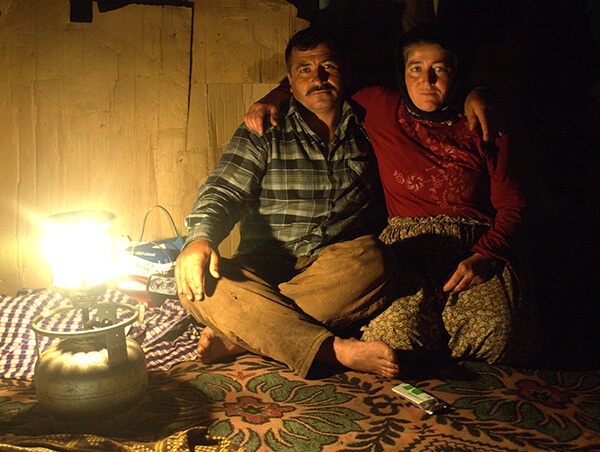
|
|
Ibrahim and Fatima: Turkish nomads in their tent.
|
No, I said. I told Fatima my friend had called, and I was returning to meet him in Beloren. It was a lie.
“Beloren,” Ibrahim said. “That will be too far to hike this evening.”
He invited me to stay the night in their tent, and I enthusiastically accepted.
Late in the afternoon, the clouds cleared, the light softened, and I found myself without much to do. I showed the nomads some photos of my family and girlfriend, Lola. It was difficult to explain what I meant by girlfriend, so I told them she was my fiancé.
Fatima’s mother, who must have been more than 80 years old, with a face as wrinkled as tree bark and glassy eyes, sat on a blanket beside me alongside her two grandchildren, Omer and Asya, Fatima’s children.
"Where are you from?" the grandmother asked.
America, I told her.
“How far away is that?”
“By plane or by walking?” I asked.
She shook her head, not understanding.
“It would take more than a year to walk there,” I said.
When the sun sank behind the mountains, the whole family went outside and began squealing, chirping, yelling, howling, grunting, and throwing rocks at their goats to gather them into a pen for the evening. The pen was surrounded by chained-up Anatolian shepherds to scare wolves away during the night.
I remained in the tent with the grandmother as the darkness steadily deepened until I could barely make out her face as we talked.
I asked where she was from.
“From the wind,” she said.
“Where do you go when it’s cold?”
“We go low. We take the tents and the animals and go below.”
I went down to the well to wash up for dinner, something no one else seemed interested in doing. Ibrahim’s shirt was still covered in goat blood, and he didn’t seem to have much to wear. Nobody did, in fact. There were a few soiled shirts and jackets, fetid and rank, hanging on hooks above the stove, but that was all. They seemed to wear the same clothes every day. Who did they need to change for?
I wondered where Fatima’s children had come from, who the father was, and where he had gone. And who did Omer and Asya have for companionship, other than each other? There were no other young people in this valley, at least not that I had seen. Perhaps they had left, gone away to live in towns. Would that be Omer and Asya’s fate? If not, who would they marry?
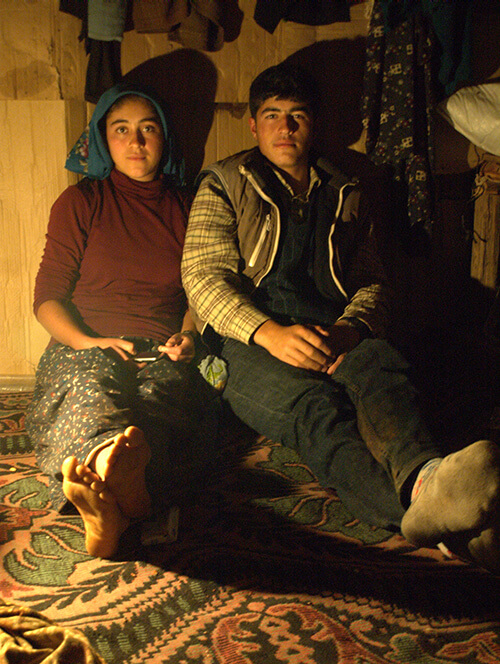
|
|
Omer and Asya.
|
I tried my best to keep an equanimous mind, not to allow my judgment to seep in, not to interpret what was happening as a spectacle. Still, as a way of life, I could not fully understand, to accept it for what it was, not to betray it. The moment my judging mind appears, I am separated from the experience; I want to maintain an open mind, free of expectation, free of difference between me and them.
We entered the tent once all the goats were gathered, and Ibrahim lit a lantern. I played music for them on my phone, Charles Mingus, but they didn’t like it. They wanted Turkish music. I played some of that as they lounged around, listening intently, absolutely still, as though movement would stop the music. The grandmother just sat there, staring straight ahead, her eyes black and glossy.
The dinner table was a cardboard box with a tray on it. Fatima pulled a dirty blanket over my legs to catch dropped food, and Asya yanked a handful of stale, crumpled bread from a sack and tossed it on the ground next to me. We ate a dinner of goat cheese, olives, and vegetable paste from a jar.
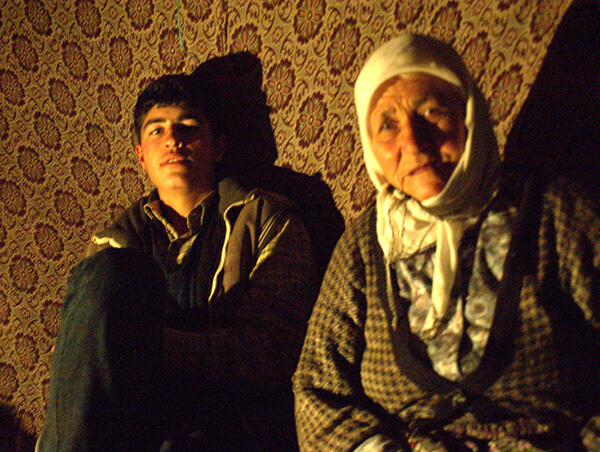
|
|
Omer and grandmother.
|
Afterward, Omer sat on his uncle's lap, touching him affectionately, rubbing his belly, and kissing his neck. Given the circumstances, I wondered what strange things isolated men like Ibrahim might be driven to do in the middle of nowhere.
Soon, Ibrahim had laid out the mats for bed. When he insisted I sleep next to him, I was a bit hesitant. I offered to lay my sleeping mat down at their feet so they had more room, but he insisted. All four of us lay down shoulder to shoulder on the floor. The pillow he gave me was damp and smelled awful, so I set it aside, rolled my jacket into my scarf, and used that instead.
I lay in the dark for about an hour, listening to Ibrahim pass gas and burp. Then his foot reached over and began touching mine. When I scooted away, he scooted closer and wrapped his leg around me. Then, I felt his fingers in my hair.
I rolled over and threw him off, but soon he was back. What could I do? I was out there alone, with nowhere to go, at the mercy of these nomads. I lay there still and angry for a long time but let go of my anger when nothing else happened.
I couldn’t sleep. In the middle of the night, I had a sudden attack of nausea. I thought it might be food poisoning and had a bit of a crisis, cringing there in pain, wondering what the hell I was doing there, what I’d gotten myself into. I wanted to run away, but where could I go?
The family snored and snorted throughout the night. Occasionally, the dogs began barking maniacally, and then I would hear voices in the dark, female voices whispering about canavarlar monsters.
There was a little hole in the roof above me; through it, I could see the sky, dusted with stars. All night, roosters and guineas squabbled outside, occasionally accompanied by the somber tinkling of goat bells. Eventually, the pain in my stomach subsided, and I fully appreciated the beauty of such an isolated place.
Ibrahim lit the lamp before sunrise. When I sat up, the whole family was gathered on the floor around the cardboard box, which held a tray of cheese and bread. They looked at me, talked in hushed tones, and waited for me to wake up so they could begin eating.
After breakfast, everyone hurried outside and began yowling at the goats, driving them from the pen into the pasture.
I readied my things and waited until they were finished to say goodbye. I made vague promises to return one day, but their blank faces expressed little confidence that I would. I hiked back to the shepherd’s well all day, where I had first camped and pitched my tent for the evening.
As I lay there that night, I felt different, but I wasn’t sure in which way. How many worlds were out there like the one I had just stumbled upon, sequestered from the outside world, with their own unique hopes and forms of happiness, just a few short miles into the forest, living life beyond time, ignoring the jets that flew over them, without electricity, without books, without homes?
I still carry the memory of those nomads, but I often wonder if I left any residual effect on them. A few photographs they would bring as they packed up their home and moved low for the winter, a vague memory of the strange man who wandered out of the woods one day and spent the night in their tent, who played strange music and asked all sorts of intrusive questions. And I wonder if they think of me as I think of them, as kin in some vague way, as members of the same family of itinerants who refuse to throw roots down, who wander endlessly from place to place, alienated from that outside world that rolls on incessantly without us. Or did they return to their lives and forget?
David Joshua Jennings is a writer and
photographer from Oklahoma, USA. You can find him at davidjoshuajennings.com.
|
